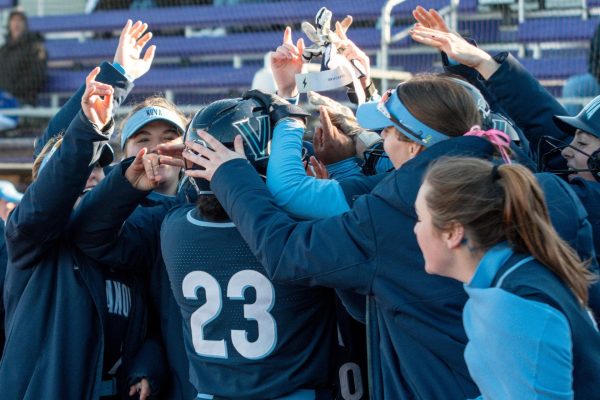An inspiring semester for displaced scholars
December 9, 2005
As a University, Villanova prides itself on its sense of “community.” It’s a word that is hard to define; it’s something that one can only know by truly seeing it in action. This past semester, the University exemplified its mission of being a welcoming community to all by opening its arms to 29 students from New Orleans-area colleges. Twenty-two students came from Tulane University, six from Loyola and one from College of the Holy Cross.The transition process has been difficult but rewarding for both the students and the faculty and staff involved. “It was hectic trying to catch up on all of the work,” freshman Maggie Ferrante from Tulane said. “But the teachers were really good about giving us enough to time to make it up.””It was hard not being where we had planned,” said freshman Mina Hariri, also from Tulane. “I had prepared myself all summer to go to Tulane, and here we didn’t really get an Orientation or anything.”The students were quick to counter any negative comments with positive ones, though. The administration met with them periodically throughout the semester in order to ensure a smooth transition. “They were always sending us e-mails, having meetings to learn about clubs, taking us to dinner at Burns Hall,” freshman Angela Deeb from Loyola said. “They gave us mentors, which were upper class students, and they were a good resource.”Villanova was one of the first universities across the country to accept students whose educations were suspended due to the damage caused by Hurricane Katrina. According to George Walter, the Associate Dean of Enrollment Services, it all started with a phone call to the admission office from the parent of a student from a New Orleans college. From there, the University formed an ad hoc committee with representatives from each of the colleges, as well as ones from the Registrar’s, Bursar’s, Financial Assistance and Residence Life offices. In a period of about 72 hours, they met, came up with a plan, and initiated it. Walter said that they met on the Wednesday before Labor Day, and the following Tuesday, students arrived at Villanova. The experience of finding a new school was a bit harder on the students.”The biggest problem with finding a school was money,” Ferrante said. “Villanova waived tuition costs, which made it a lot easier.”The University agreed to not charge tuition, which allowed the New Orleans colleges, which had already accepted the students’ tuition payments, to use that money for rebuilding efforts. The students left New Orleans with almost nothing. When evacuating, they were told that they would be able to return in a few days, so many took only the essentials. Some had only a small duffel bag of clothes with them. Deeb did not even bring her computer, but Villanova provided her with one as she is a student in the College of Commerce and Finance. The majority of the students were only able to return to their campuses to pick up the rest of their belongings in mid- to late November. Despite the hardships – being the “new kid,” living at Harcum, making up schoolwork, having few of their possessions – the students came through the experience with a positive outlook. “I feel like we should say thank you somehow,” Ferrante said. “This is something I’ll always remember.””It was a crazy first semester, but it was definitely a memory,” Deeb said.Even for the faculty, the experience was an inspiring one.”I came to Villanova in 1989, and one of the reasons I decided to join the community was the sense of warmth and welcoming it had,” Walter said. “This experience has served to reinforce that impression, and prove that we live what we say, that we really are a community.”Many students will return to their universities when they open for the spring semester. Several students, however, have chosen to remain at Villanova and have applied for regular admission.










